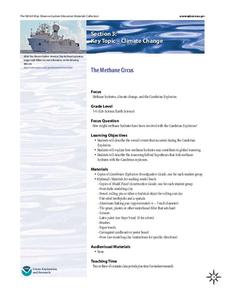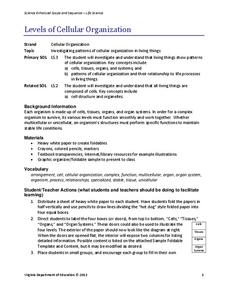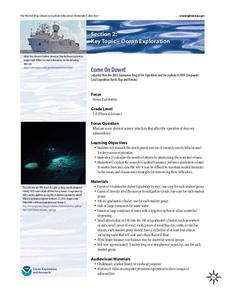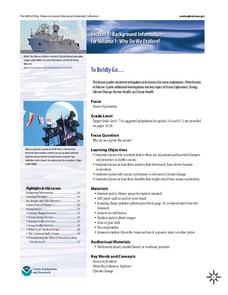NOAA
What's the Big Deal?
Who knew that a possible answer to Earth's energy resource problems was lurking deep beneath the ocean's surface? Part four of a six-part series introduces Earth Science pupils to methane hydrate, a waste product of methanogens. After...
NOAA
The Methane Circus
Step right up! An engaging research-centered lesson, the third in a series of six, has young archaeologists study the amazing animals of the Cambrian explosion. Working in groups, they profile a breathtaking and odd creature and learn...
NOAA
Microfriends
Is there medicine found in the organisms that live deep below the surface of the ocean? The fifth lesson in a six-part series has learners team up to research bacteria and the relationship it has with nearly every living thing on Earth....
California Department of Education
Hazards in the Workplace
Safety first! Safety first! A short video and a PowerPoint presentation introduce job seekers to child labor law awareness, safety standards, and ways to reduce workplace injuries. Class members first take a short workplace safety quiz...
NOAA
Animals of the Fire Ice
When the sun's rays can't reach the producers in a food web, where does all the energy come from? Extreme environments call for extreme food sources. Young scientists investigate creatures that appear to get their energy from methane...
NOAA
What Killed the Seeds?
Can a coral cure cancer? Take seventh and eighth grade science sleuths to the underwater drugstore for an investigation into emerging pharmaceutical research. The fifth installment in a series of six has classmates research the wealth of...
Virginia Department of Education
Levels of Cellular Organization
What an eccentric way to learn about each level of cellular organization! Allow emerging biologists to utilize white paper and create their own foldable charts to describe each level of organization in the body. You may also adapt the...
Curated OER
The Legendary Raptors
How are raptors and airplanes alike? Combine science and language arts in this fun and interactive project. Young scientists research the animal in order to design their own aircraft, and compete in a contest for farthest, fastest, and...
Howard Hughes Medical Institute
Lesson 2: Gorongosa National Park
How has Gorongosa National Park changed over time? Discover the park's rich history, dating back to primitive human times, through an interactive timeline and scientific reading. The second installment in an eight-part series explores...
NOAA
Come on Down!
What do we do when a dive is too dangerous for humans to accomplish? Send in the robots! Middle school scientists get acquainted with several different models of submersible robots in the second lesson of six from NOAA. Lab groups then...
NOAA
To Boldly Go...
When we think of ocean exploration, many of us have visions of sunken pirate ships full of treasure or mysterious creatures of the deep. What really motivates deep-sea investigation? The first in a series of diverse six-part lessons...
NOAA
Where Have All the Glaciers Gone?
What happens when ice melts? Well ... water happens. When that melting ice is a glacier, the amount of water that results produces change throughout the world. Middle school science sleuths uncover the truth about global warming, the...
Curated OER
For the Love of Publication!
What is a ‘Zine? Although the referenced PBS video that launches this study of self-published magazines is not available, the activities detailed and the step-by-step directions for creating ‘Zines would engage young writers. This...














